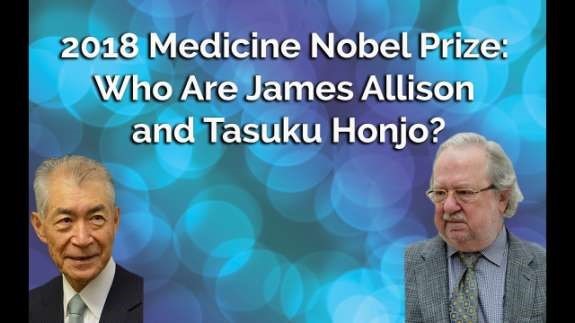
Tasuku Honjo (Left) and James P. Allison (Right), Nobel Prize winners in Physiology or Medicine, 2018
The 2018 Nobel Prize in Physiology or Medicine has been awarded jointly to James P. Allison, University of Texas MD Anderson Cancer Center, Houston, TX, USA, Parker Institute for Cancer Immunotherapy, San Francisco, CA, USA and Tasuku Honjo of Kyoto University, Kyoto, Japan. Their landmark discoveries in cancer cure with different but complimentary strategies is likely to immensely benefit humanity. The treatment of cancer is focussed on engaging the human T-cells a type of white blood corpuscle. The immune system works by firmly recognizing ‘self ‘ from ‘non-self’. Once the ‘non-self’ is identified which is usually the disease causing agent, a bacteria or a virus, the Tcells attack and kill them. Sometimes an error in recognizing ‘self ‘ from ‘non-self’ occurs and results in auto-immune disease therefore a balance is required and thus these proteins act as accelerators and brakes.
James P. Allison’s research shows that the activity of T-cells is controlled and fine-tuned by ‘accelerators’ and ‘brakes’. CTLA-4 is one of the proteins produced by T-cells which acts as a brake on the immune activity. The new idea was to neutralise this protein which acts as a brake. Allison produced an antibody which would bind to CTLA-4 and unlock the ‘brake’ so that the potential of the immune system is unleashed and the tumour is destroyed.
Tasuku Honjo discovered PD-1, a protein acting as a brake on the immune system functions. He demonstrated that its mechanism of action is different from that of CTLA-4. His research is also aimed at inactivating this protein to enable the immune system to function with full potential.
Allison tested mice afflicted with cancer by giving them antibodies to inactivate CTLA-4 protein thus unlocking the potential of the immune system to fight with cancer. The results were spectacular because the mice with cancer were cured by treatment with antibodies. This treatment has to be expanded to humans to see how much effective this treatment would be. With similar treatment the skin cancer has been treated in patients with melanoma.
These discoveries hold immense potential and if these are successful in curing cancer, there would be a revolution in health care system thus saving the people from untold misery and difficulty.
Professor S. P. Singh, Ph.D.
Editor-in-Chief, Human Biology Review
Former Dean, Faculty of Life Sciences,
Punjabi University, Patiala, India